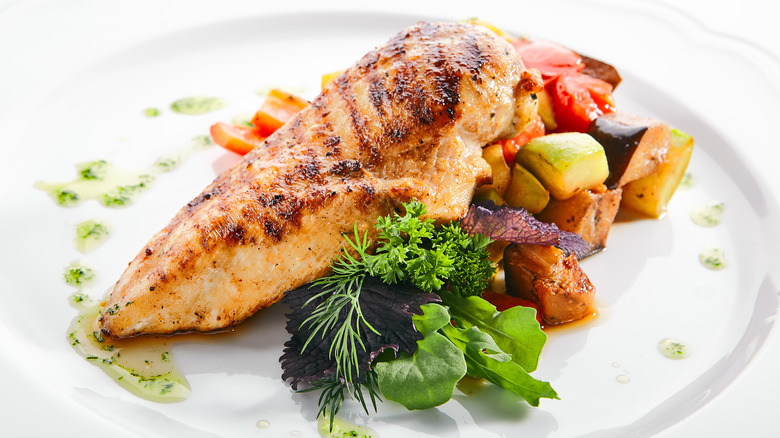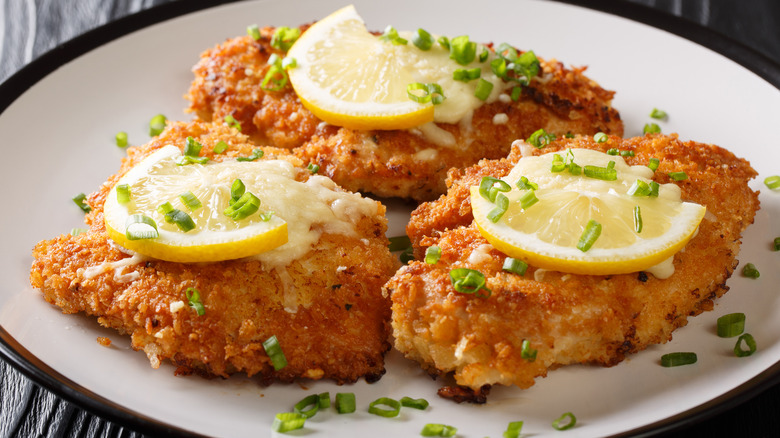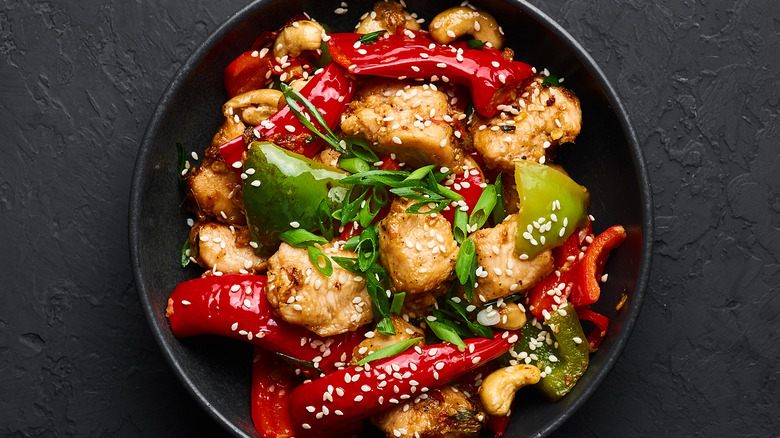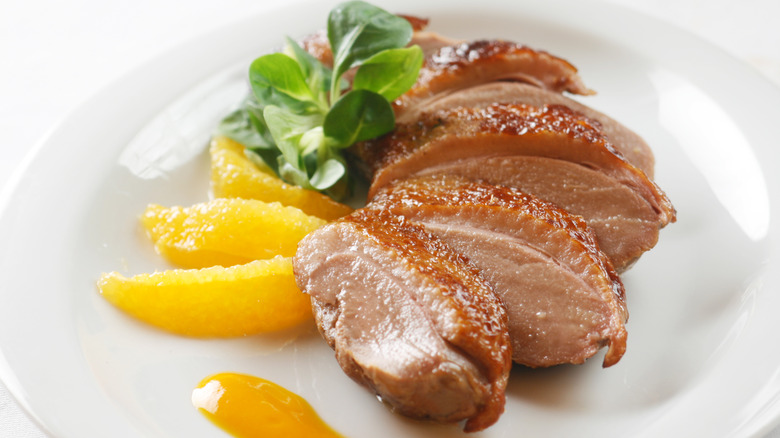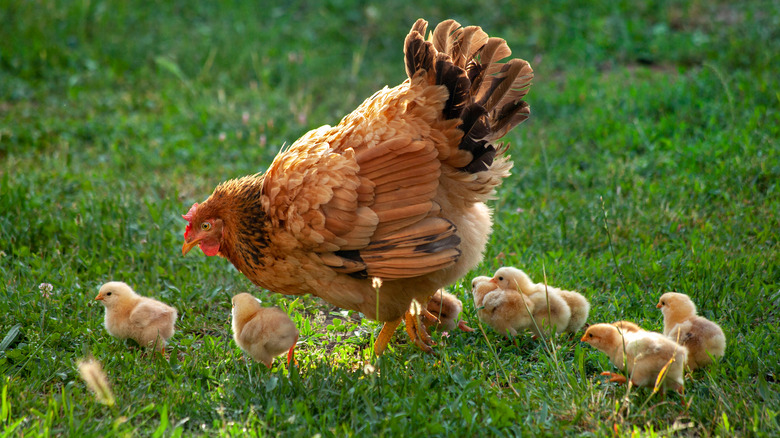The Truth About The Pollotarian Diet
We've said it before and we'll say it again — we're so intrigued when someone labels themselves in accordance to what they eat. For example, a vegetarian, a vegan, or a chocoholic (perhaps not quite as official, but we can definitely identify). That is why we decided to look into the pollotarian diet.
To start, what is a pollotarian? The word pollo is both the Spanish and Italian word for chicken. And according to Healthline, a pollotarian is someone who eats poultry but avoids pork and red meat. So the pollotarian diet could be an option for someone who would prefer to take small steps instead of a big leap to becoming a vegetarian. Or maybe it could be an adopted eating plan because of ethical reasons surrounding the health effects and environmental damage done by the red meat industry.
But no matter what your reason is behind taking on the label pollotarian, here is what you should know first.
The pollotarian diet focuses on chicken and plant-based options
The pollotarian diet is not a diet asking its followers to track calories, log what they've eaten, or allow for cheat days. It is an eating plan that is more focused on eliminating red meat and pushing for chicken and plant-based meal options. Pinterest shares a few popular recipes for a pollotarian, such as chicken and broccoli stuffed crepes and a crispy lemon chicken romano. Being a pollotarian is often associated with or compared to being a pescatarian (a person who is vegetarian but will eat fish) or a flexitarian (a person who is vegetarian but will occasionally eat meat or fish). There is not much research done on the pollotarian diet's benefits, but as Healthline states, it is widely seen as a healthy and sustainable eating plan.
There is, however, plenty of research on the positive health effects of cutting out red meat from your diet. In a study done by Harvard Health, it was concluded that people who had diets high in red meat, especially processed meats, were more likely to have cardiovascular disease or cancer, and had a 13 percent increased risk of mortality.
There are major benefits to choosing chicken or vegetables over red meat
Dr. Walter Willett, a senior scientist on the team and the chair of the departments of nutrition and epidemiology at the Harvard School of Public Health, states the benefits of substituting red meat with chicken or vegetarian options by giving us the numbers. "If someone who has a 50 percent risk of dying in the next 25 years replaces one serving of red meat per day with chicken, the risk is decreased to about 42 percent, and to about 40 percent if nuts replace red meat," he explains.
The health benefits of cutting out red meat and following a pollotarian diet are looking mighty tempting right now. But there are a few drawbacks to consider. Healthline says that by eliminating red meat from your diet, you are at risk for possible nutrient deficiencies. Followers of the pollotarian diet may experience low levels of iron, zinc, vitamin B12, calcium, and omega-3 fatty acids. This doesn't mean it is the case for everyone, but it is beneficial to be aware of so that you can get enough of these nutrients from pollotarian-approved food sources.
The pollotarian diet can include more than chicken
If you're new to the pollotarian diet, at times, you may seek variety — it's totally natural! So you might wonder what other foods are okay to consume aside from chicken. Well, for starters, you might want to look into other poultry options such as geese, ducks, pheasants, quail, and turkey. Ducks are one of the best sources of protein and iron, which are necessary to produce fresh blood and build muscles, per Health and Social Services (HSS). Turkey is another nutritious option, being a rich source of protein, good fats, zinc, and energy compounds, that reduce the risk of heart diseases, strengthen the bones, and improve brain functions (via BBC Good Food).
If you're an egg lover, look no further than quail eggs, which are packed with essential nutrients, B vitamins, amino acids, and even collagen to promote healthy skin, reports Health Benefits Times. Quail eggs may even increase metabolism, regulate blood sugar, and maintain blood pressure.
While most pollotarians avoid eating anything other than poultry, you may consume various types of seafood, including both fish and shellfish as well. However, this diet is categorized as pesce-pollotarian, according to Healthline. Additionally, as a pollotarian, you would steer away from consuming red meat, including beef, lamb, and pork.
How the pollotarian diet benefits weight loss
The pollotarian diet may be able to help you achieve your weight loss targets. For example, chicken is a protein-rich food that is helpful for those wanting to manage their weight, explains Healthline.
In fact, a 2015 study published in the journal Food and Nutrition Research explored the benefits of eating chicken and its relationship with overall health. The study found that the nutrients in poultry not only help prevent obesity, but it can also help stave off life-threatening cardiovascular diseases. The research even claimed it's an incredible food choice for those seeking a high-quality source of calories and requiring more protein in their diet.
The high protein content may also help aid in weight management due to its ability to curb your appetite without consuming high amounts of calories, reports Healthline. In addition to the lean protein aspect of the pollotarian diet, the fact that it's also focused on upping your intake of fruits and vegetables makes it particularly beneficial for weight loss.
Can the pollotarian diet help regulate blood sugar levels?
Diabetes is a condition that causes a spike in your blood sugar levels. Healthline suggests that by cutting down on red meat and opting for poultry and plant-based foods that are rich in fiber, you can mitigate the risks of type 2 diabetes. Medical News Today recommends that diabetics eat lean meat (low in saturated and trans fats), like skinless chicken and turkey, because they have roughly 1 gram of fat and fewer than 40 calories per ounce (via the National Heart, Lung, and Blood Institute).
In addition, the nutrients packed in chicken offer exceptional protection against diabetes in the long run (via Healthline). Overall, it's a good source of iron, vitamins, minerals, and critical proteins, and it can help prevent overeating after meals, reports Beat Diabetes App. At the same time, this meat has a low glycemic index, making it a must-have food for diabetics, per chicken.ca.
Is the pollotarian diet good for the environment?
Aside from benefitting your overall wellbeing, a pollotarian diet can have a positive impact on the environment. Beef production and consumption alone require approximately 40 times more resources, such as land and water (via Healthline). Moreover, it may have a significant impact on climate change due to the high output of carbon emissions, according to World Wildlife Fund (WWF). They further explain that taking care of cows and other similar animals releases 7-18% of methane gas into the environment, leading to impacts on our climate.
National Geographic reports that dietary carbon footprints can be cut in half if we choose chicken over beef. Diego Rose, a researcher at Tulane University's School of Public Health, was a lead author of a study about carbon emissions as a result of dietary choices. He told National Geographic, "We knew eating chicken instead of beef would lower carbon emissions related to diet but it was much lower than expected."
